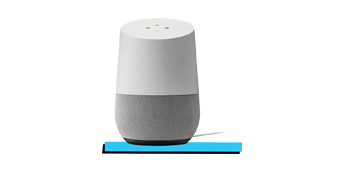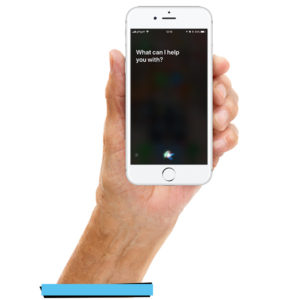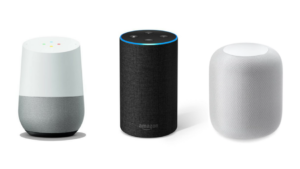
“1 in 5 Mobile Search Queries now come from voice searches.”
In January we reported the above fun fact. That 20% of searches on mobile now come from voice searches. We decided to dive into this and explore some more.
What does this fact actually mean for the humble advertiser? Some industry types are expecting a
Voice Search Revolution and others are not so sure. Here at KMG, we foresee the continued rise in voice technology as a key part of the digital future. Part of the developing multi-faceted nature of user behaviour.
For those that are not yet familiar with voice searches or voice commands, it refers to apps being instructed by a person physically speaking to their smartphone or personal assistant device. Siri is perhaps one that you may have heard of. It is built into Apple products, others include Microsoft’s
Cortana or the
Google Assistant.

According to research, men are currently using voice search functions more often than women, and voice searching as a whole is becoming more common place in public. It seems people are calling upon their devices
vocally when they are out and about, on public transport or in the office. We use a
Google Home here at KMG.
A significant amount of these users dictate text messages with their voice. Their phone will produce a message to their mother asking what’s for dinner, or to their significant other to see how their day is going, and then send it on their behalf. What about those of us that are used to using slang and abbreviation in our texts, the LOL generation if you will? How accurate is the digital scribe at emojis and conveying sarcasm I hear you ask? I have no doubt that in time with the advancement of Artificial Intelligence, these in built assistants will learn our personal language patterns, quirks and sense of humour better than we know it ourselves.
Smart home Speakers such as
Google Home or the
Amazon echo let you turn ‘your home into an automated, voice-activated and app-controlled hub.’ How do people engage with these devices?
Amazon Echo uses “Alexa” as its trigger word and
Google Home wakes up to “Okay, Google...” There’s even Google Home Minis now. Users can turn their music up or over, set an alarm, be reminded of their diary, turn off the lights, get directions or find out the weather. Saving time and streamlining their lives.

Most importantly to us digital marketers, users are
asking their devices
online search queries. Voice search queries are a different format to their typed equivalent. Voice searches are much longer and more conversational. They are framed as full questions, for example: “Okay Google… what’s the best hilal butchers near me?” Long
er tail keywords are necessary to get in front of these searchers, mostly four to five keywords on average.
Unlike traditional mobile or desktop apps, users interact with apps for the Assistant through a conversation, natural-sounding back and forth exchanges, and not traditional, computer-centric paradigms.’ Google
Furthermore, advertiser content should explicitly address questions that start; “what, which, who, why and how.” These are the questions naturally used in voice search queries. There are SCHEMA mark-up codes and technical tactics to be added that help to optimise your website as well. Establishing this voice-first SEO strategy is increasingly effective and important, so that advertisers can now be
heard as well as seen.
Talk to your KMG account manager today about your SEO options.

 According to research, men are currently using voice search functions more often than women, and voice searching as a whole is becoming more common place in public. It seems people are calling upon their devices vocally when they are out and about, on public transport or in the office. We use a Google Home here at KMG.
A significant amount of these users dictate text messages with their voice. Their phone will produce a message to their mother asking what’s for dinner, or to their significant other to see how their day is going, and then send it on their behalf. What about those of us that are used to using slang and abbreviation in our texts, the LOL generation if you will? How accurate is the digital scribe at emojis and conveying sarcasm I hear you ask? I have no doubt that in time with the advancement of Artificial Intelligence, these in built assistants will learn our personal language patterns, quirks and sense of humour better than we know it ourselves.
Smart home Speakers such as Google Home or the Amazon echo let you turn ‘your home into an automated, voice-activated and app-controlled hub.’ How do people engage with these devices? Amazon Echo uses “Alexa” as its trigger word and Google Home wakes up to “Okay, Google...” There’s even Google Home Minis now. Users can turn their music up or over, set an alarm, be reminded of their diary, turn off the lights, get directions or find out the weather. Saving time and streamlining their lives.
According to research, men are currently using voice search functions more often than women, and voice searching as a whole is becoming more common place in public. It seems people are calling upon their devices vocally when they are out and about, on public transport or in the office. We use a Google Home here at KMG.
A significant amount of these users dictate text messages with their voice. Their phone will produce a message to their mother asking what’s for dinner, or to their significant other to see how their day is going, and then send it on their behalf. What about those of us that are used to using slang and abbreviation in our texts, the LOL generation if you will? How accurate is the digital scribe at emojis and conveying sarcasm I hear you ask? I have no doubt that in time with the advancement of Artificial Intelligence, these in built assistants will learn our personal language patterns, quirks and sense of humour better than we know it ourselves.
Smart home Speakers such as Google Home or the Amazon echo let you turn ‘your home into an automated, voice-activated and app-controlled hub.’ How do people engage with these devices? Amazon Echo uses “Alexa” as its trigger word and Google Home wakes up to “Okay, Google...” There’s even Google Home Minis now. Users can turn their music up or over, set an alarm, be reminded of their diary, turn off the lights, get directions or find out the weather. Saving time and streamlining their lives.
 Most importantly to us digital marketers, users are asking their devices online search queries. Voice search queries are a different format to their typed equivalent. Voice searches are much longer and more conversational. They are framed as full questions, for example: “Okay Google… what’s the best hilal butchers near me?” Longer tail keywords are necessary to get in front of these searchers, mostly four to five keywords on average.
Unlike traditional mobile or desktop apps, users interact with apps for the Assistant through a conversation, natural-sounding back and forth exchanges, and not traditional, computer-centric paradigms.’ Google
Furthermore, advertiser content should explicitly address questions that start; “what, which, who, why and how.” These are the questions naturally used in voice search queries. There are SCHEMA mark-up codes and technical tactics to be added that help to optimise your website as well. Establishing this voice-first SEO strategy is increasingly effective and important, so that advertisers can now be heard as well as seen.
Talk to your KMG account manager today about your SEO options.
Most importantly to us digital marketers, users are asking their devices online search queries. Voice search queries are a different format to their typed equivalent. Voice searches are much longer and more conversational. They are framed as full questions, for example: “Okay Google… what’s the best hilal butchers near me?” Longer tail keywords are necessary to get in front of these searchers, mostly four to five keywords on average.
Unlike traditional mobile or desktop apps, users interact with apps for the Assistant through a conversation, natural-sounding back and forth exchanges, and not traditional, computer-centric paradigms.’ Google
Furthermore, advertiser content should explicitly address questions that start; “what, which, who, why and how.” These are the questions naturally used in voice search queries. There are SCHEMA mark-up codes and technical tactics to be added that help to optimise your website as well. Establishing this voice-first SEO strategy is increasingly effective and important, so that advertisers can now be heard as well as seen.
Talk to your KMG account manager today about your SEO options.